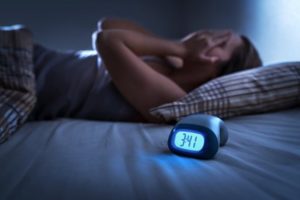
Every night, millions of Americans miss out on countless hours of sleep because of sleep apnea; and even worse, many more cases go completely undiagnosed! That said, missing out on rest isn’t the only thing you have to worry about if you have sleep apnea—the condition can also take a serious toll on your brain health! Here’s more from your dentist about this connection along with why addressing sleep apnea is absolutely in your best interest.
How Sleep Apnea Affects Your Brain
Sleep apnea is characterized by the blockage of your airway during sleep—so how does this affect your brain? It has to do with the breakdown of the blood-brain barrier; this barrier protects the brain tissue from harmful bacteria, infections, and chemicals. Researchers believe that the body’s reduction in oxygen-intake (resulting from sleep apnea) is what causes this damage to the blood-brain barrier and compromises its functionality. The brain is affected in the following ways:
- Memory loss – If you’re frequently waking up throughout the night, you might experience things like daytime fatigue, a shortened attention span, moodiness, and reduced short-term recall. One of the important brain functions of sleep is memory-processing and consolidation; if you aren’t entering deep sleep, your brain can’t correctly archive your memories!
- Inhibited brain function – A study published in the Journal of Sleep Research by the UCLA School of Nursing found that the insular cortex region of the brain could actually become injured due to a chemical imbalance in the brain caused by sleep apnea.
- Changes to the brain’s shape – Studies also show that the mamillary bodies, which are structures in the brain responsible for memory, are nearly 20% smaller in adults who suffer from sleep apnea. This literal change to the brain’s structure and shape can have serious consequences including decreased cognitive function.
The Importance of Addressing Sleep Apnea
Sleep apnea should not be left unaddressed—and fortunately, sleep apnea therapy is an effective means of mitigating the symptoms caused by it, which in turn will protect your brain! If diagnosed by a sleep doctor, treatment options include things like oral appliances, CPAP machines, and more, all of which are effective. In fact, studies show that continues positive airway pressure (CPAP) therapy on patients with significant brain matter damage (resulting from sleep apnea) can effectively restore the brain to healthier levels just after a year of treatment. All-in-all, helping to restore your brain’s blood-barrier is in your best interest, especially if sleep apnea has compromised it. Sleep apnea therapy is the absolute best way to go about this.
If you’re concerned about the impact that your sleep apnea might be having on your brain’s wellness, don’t hesitate to speak with your dentist about possible treatment options.
About the Practice
The team at Lake Nona Dental Group is thrilled to serve the dental needs of the Orlando area from their Moss Park Rd. and Jack Brack Rd. locations. The practice is proud to house six incredibly skilled specialists: Dr. Michael Oslund, Dr. Matthew Yantorni, Dr. Ivan Montijo, Dr. Lauren Coughlin, Dr. Sagir Patel, and Dr. Laura Van de Water. They’re pleased to offer several available services including sleep apnea treatment. If you’d like to schedule a visit, you can contact the practice online to find the closest office near you.


